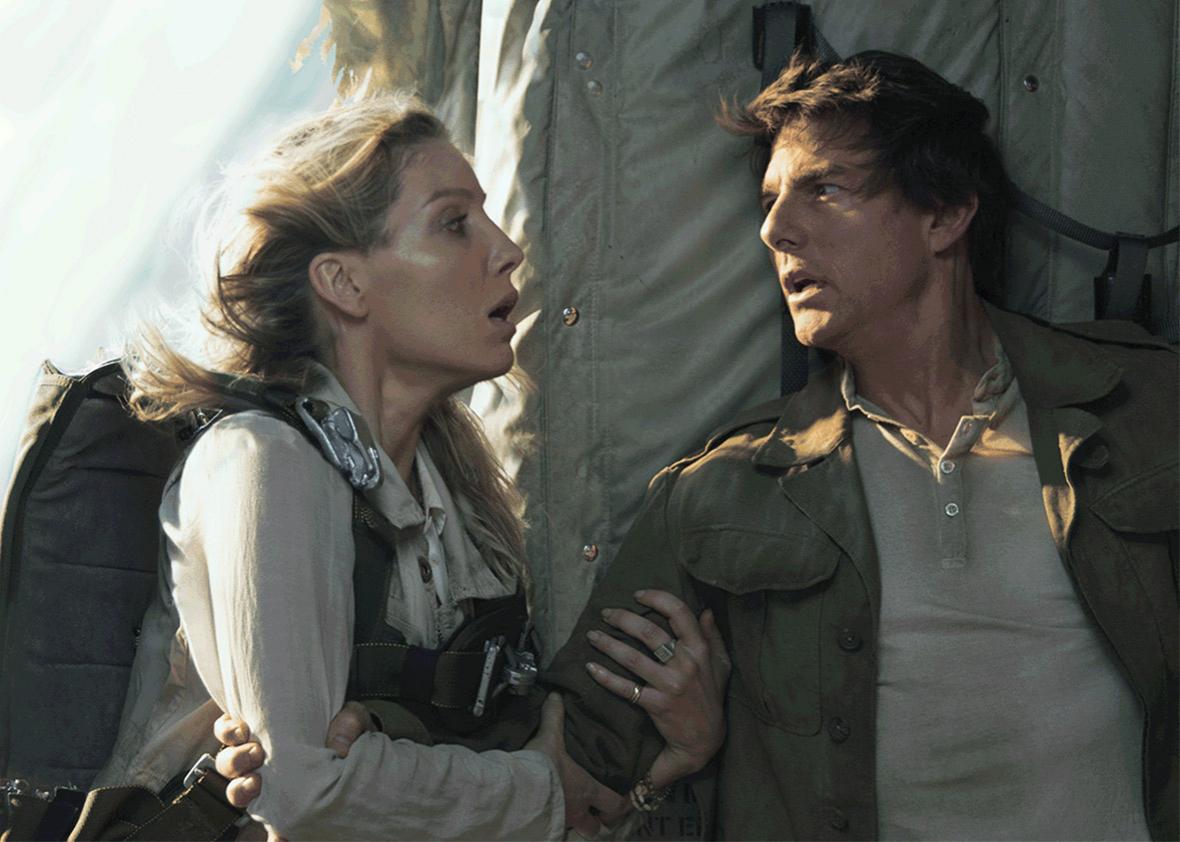The Mummy is the story of an ageless creature who exists outside the realms of life and death, perfectly preserved and yet not quite human. It is also the story of a mummy. But as eerie inhumanity goes, Sofia Boutella’s Ahmanet, an ancient Egyptian princess who is buried alive for 5,000 years and re-emerges to menace the world of the present day, has nothing on Tom Cruise, who plays the cocky, rule-breaking adventurer who stumbles onto her tomb in the middle of present-day Iraq. (What an Egyptian is doing buried in Iraq is explained, but not well.)
It’s not necessarily a fault that Cruise is playing the same character he’s been playing for more than 30 years, a collection of impulses held together with sunglasses and a smile. Settling on a core character type (or two or three) is what distinguishes a movie star from a mere actor. Great stars find ways for those characters to evolve, the way the glib kid from Risky Business became the lonely visionary of Jerry Maguire and the entitled prick of Vanilla Sky. But as Cruise has moved firmly into middle age, his characters have stopped getting older.
Sometimes that stuck-in-time quality has been a plot point: Edge of Tomorrow trapped him in an endless replay of a single day, and in Oblivion, he was recycled and replicated like a human product. But The Mummy doesn’t explain why Cruise’s character, Nick Morton, who is vaguely identified as some sort of U.S. soldier, is still running hot-zone reconnaissance missions while in his mid-50s, nor are we meant to take note of the 20-year age gap, give or take, between him and his love interests, both living (Annabelle Wallis) and mummified. When Wallis’ Jenny, who’s done up more like a telegenic foreign correspondent than the archaeologist she’s presented as, decides to razz Nick in public about his sexual performance—because of course they’ve slept together although it happens before the movie begins—she accuses him of finishing too quickly instead of reaching for a Viagra joke.
Cruise is in spectacular physical shape, and The Mummy makes sure we know it. (The scene where he’s nude but for a carefully positioned morgue table bears the traces of a digital nip and tuck, but who among us couldn’t benefit from a little postproduction tweak?) But his commitment to the role ends at the gym door. There’s a hollowness behind his eyes, as if he’s acting on muscle memory alone. Screwball barbs come off as hostile jabs because Cruise doesn’t connect with the other actors on screen; they might as well have been dropped in via green screen.
Then again, given the movie’s incoherence, remote-control acting might have been the best if not the only course. The Mummy is the intended launch pad for Universal’s “Dark Universe,” a series of planned monster-movie revamps that includes Bride of Frankenstein, The Invisible Man, and, depending on whom you ask, everything from Dracula to The Hunchback of Notre-Dame. But it’s a rickety foundation at best, cobbled together from a script with six credited writers whose tone veers wildly from scene to scene. One moment, it’s oozing horror, with Russell Crowe’s Henry Jekyll (yes, that one) narrating as we see Ahmanet’s face bathed in an infant’s arterial spray. The next, Cruise and Jake Johnson, as his sidekick, Chris Vail, are cracking wise like Indy and Sallah. Universal might have found more tonal consistency if it just straight-up remade Abbott and Costello Meet Frankenstein.
You can feel bits of interesting ideas floating around inside The Mummy: The movie makes repeated references to the Crusader invasion of Egypt, and the Iraq scene opens with jihadists machine-gunning ancient statuary, suggesting that Ahmanet’s liberation is a post-colonial version of the return of the repressed. But any hope that the movie has any brains left inside its excerebrated cranium is quashed when, as they’re running from those unspecified insurgents, Johnson’s character calls in a drone strike on their village, and the movie goes several minutes before offhandedly mentioning that, oh yeah, all the villagers were cleared out first. “Hooray for the drone strike!” is not really a sentiment a movie that just wants you to lie back and enjoy can afford to incite.
As obligatory franchise installments, The Mummy and Wonder Woman are more alike than they are different, but it’s telling where they diverge, and not just because Diana is likely to bury Ahmanet at the box office this weekend. Wonder Woman’s heroine is a demigoddess strong enough to toss tanks around as if they’re origami; the women in The Mummy are, one, a desiccated heap of bones who reanimates herself by literally sucking the life out of men, and, two, a featherweight blonde whose primary defense mechanism is to yell “Nick!” and cower until Cruise’s character saves her. That Boutella’s character is frequently naked or clad in a bandage-draped bodysuit—or, at one point, chained in what looks like one of Christian Grey’s bondage harnesses—gives her predations a sensuous cast that becomes especially ugly when the roles are reversed in the movie’s climactic battle. (As a general rule, a hero’s victory should resemble a sexual assault as little as is possible.)
The Mummy doesn’t end with the obligatory post-credits scene, and though a few storylines are left open-ended, for future installments to resolve, the Dark Universe–building is half-hearted, like a pitch from a salesman who can’t wait to get back to his hotel. Cruise seems weariest of all, flogging outdated merchandise he can’t even pretend to believe in. It’s not Cruise that feels ancient; it’s The Mummy.
